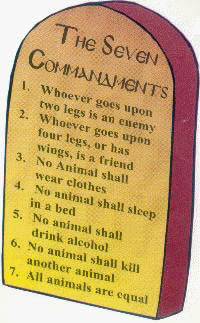




|
|
|
|
|
by George Orwell
ADAPTED & DIRECTED by
MAKKI MARSEILLES
ANIMAL MASKS by
P. MITSAKAKI & T. PETMEZAS
COSTUMES & HUMAN MASKS by KIM O'NEILL
MUSICAL ARRANGEMENTS by FOTIS TSEVAS
MUSIC & SOUND RECORDINGS by JOHN MOSCHOPOULOS
|
|

from the programme
|
First performance :
23 November 2002
George Orwell's story of a revolution that went wrong!
A large number of animals led by the pigs rise in revolt against their owner, a farmer, and successfully manage to run 'Animal Farm' on their own. Everything works beautifully - in
the beginning. When the pigs take over the running of the farm though, things begin to start slowly on Animal Farm. The Seven Commandments on the left, begin to change slowly and one by one, until...
|

the performance poster
|
|
The Author George Orwell, was born in India in 1903, where his father was a civil servant.
His real name was Eric Arthur Blair. He went to Eton, perhaps lie most exclusive private school in England, and contributed regularly articles in various college magazines. In 1922 he joined the Indian Imperial Police. He served
for five years in Burma, and recorded his experiences in his first novel "Burmese Days" (1934). Most of the time he lived in great poverty. He lived in Paris for two years before returning to London where he did a
number of jobs including bookshop assistant, schoolteacher and private tutor, always contributing reviews and articles in magazines from his experience which he published as and Out in Paris and London"(1933) In
"The Road to Wigan" (1937) he gave a powerful description of poverty he saw when he visited Lancashire and Yorkshire. In 1936, Orwell went to fight against the fascisti of Franco and was wounded. In "Homage to
Catalonia" he gives his account of the Spanish Civil War. In 1938 he was admitted to a sanatorium and from then on he never recovered from his illness. He worked for the BBC, and was literary editor of the Tribune newspaper
where he contributed political and literary commentary. He also wrote for the Observer, and later the Manchester Evening News. His political allegory "Animal Farm" was published in 1945 and was an immediate
success. Together with his other major novel, "Ninety eighty Four", a pessimistic account of the rise of totalitarianism, brought him world-wide recognition. He died in 1950. He has made an indelible mark on
English Literature and rightfully he is regarded among the few memorable writers of his generation. |
|
|
|
What it all meant
|
|
Manor Farm
Mr Jones
The Animal Rebellion
Old Major
Animalism
Mollie
Moses
Pilkington & Fredericks
Dogs
Napoleon
Snowball
Squealer
Windmill
Sheep
|
Russia
The Romanov Tsars who ruled Russia
Agricultural Workers the majority in Russia
The Russian Revolution took place in 1917
Lenin, Marx and Engels
The Communist Manifesto
The rich who wanted personal wealth.
The Russian Church which was outlawed
The White Russians who opposed the revolution
The Cheka, the secret service, the police, the KGB
Stalin
Trotsky
The propaganda machine
Four legs good two less bad
|
|



|
|
|

